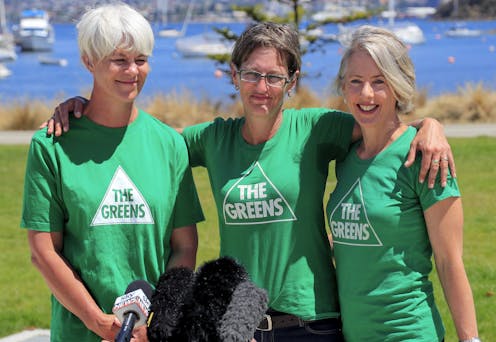As Tasmania looks likely to have minority government, the Greens must decide how to play their hand
- Written by Narelle Miragliotta, Senior Lecturer in Australian Politics, Monash University

According to Tasmanian Greens leader Cassy O'Connor, “minority government is government for grown-ups”, whereas “majority government is government for vested interests, corruption and corporate deals”.
The Greens’ pitch to voters at Saturday’s Tasmanian state election is not being couched in policy terms alone. It is also based on a vision of a more desirable governing context for Tasmania. But is minority government good for the Greens?
The likelihood of minority government
There is a high probability that the Greens will get their wish and a minority government will be returned at this election.
Tasmania elects its lower house using a form of proportional representation known as the Hare-Clark system, where parties are awarded seats roughly in accordance with their levels of support within the electorate. Unless a party can win an overall majority of votes, it will not attain the necessary majority of seats to form a government in its own right.
In recent decades, the two major parties have struggled to secure governing majorities. In the eight Tasmanian elections since 1989, majority governments have been elected on only five occasions.
Read more: Tasmanian election likely to be close, while Labor continues to lead federally
There is general agreement among commentators that a majority government at this election is far from certain. The Liberal Party attained 51.22% of the vote in 2014, and lead Labor in most polls. However, according to analysis by Ben Raue, the Liberals polled above 40% in just one of five polls held in the last year. If these figures are translated into actual votes, minority government is inevitable.
One might think that the possibility of minority government would render the major parties open to working with the Greens to form government. Yet the incumbent premier, Will Hodgman, has already declared that the Liberals “will govern alone or not at all”.
Likewise, Labor leader Rebecca White has also confirmed that her party “will not govern in minority”.
Much of this talk should be taken seriously but not literally. The major parties will be under pressure to negotiate an agreement of some description in the likely event of a hung parliament.
Any party that seeks to govern without the support of opposition forces will be perpetually at risk of defeat on the floor of the lower house. This reality is likely to weaken the resolve of even the most stubborn party leader – even more so once Governor Kate Warner makes the necessary entreaties.
However, it is not certain that the Greens will be the only parliamentary grouping in the mix to form a minority government. The most recent polling data (based on a MediaReach internal poll commissioned by the Liberal Party) has the Greens’ statewide primary vote at under 13%, which may not prove sufficient to secure the all-important “hinge seat” in each of the five multi-member electorates.
One of the particular challenges the Greens are confronting in 2018 is Labor’s capacity to outmanoeuvre them. As psephologist Kevin Bonham has observed, the Greens are being squeezed by the appeal of Labor’s “left-wing leader”.
Labor has also stolen the Greens’ thunder on the pokies issue, and its energy policy – complete with 120% renewable energy target – is likely to find favour with environmentally concerned voters.
Adding to the uncertainty is the prospect – albeit faint given recent polling – of the Jacqui Lambie Network (JLN) electing one, possibly two candidates. The JLN might make more attractive legislative partners for the major parties than the Greens.
Is minority government good for the Greens?
There is a deeper question that the Greens must ask: whether it is prudent for them to enter into any kind of formal arrangement with either major party.
There are advantages in the short term, such as policy concessions and even the possibility of executive office. But the longer-term consequences are far less clear.
Read more: Tasmania the first test in an election-laden year
The Tasmanian Greens suffered swings against them following the three previous occasions that they entered into some form of agreement to support a minority government: -3.9% in 1992, -2.1% in 1996, and -7.8% in 2014.
Though there were unique circumstances surrounding each of these agreements, it is unclear if the benefits outweigh the costs for the Greens. One international study concluded that participation in government “is not necessarily bad for Green parties”, which falls well short of a ringing endorsement.
If, following this election, the Greens are needed to form a stable government, then the party will have to think strategically about the terms on which it does so. Is participation in executive office a higher prize than consistency of electoral performance?
If the Greens value the former, then securing a formal agreement is the best way forward. But if they value the latter, then a “confidence-and-supply agreement” is their best option. This would allow the Greens to demand additional parliamentary resources and to shape the fate of legislation, without having to shoulder responsibility for government failures at a critical time in the party’s development.
Authors: Narelle Miragliotta, Senior Lecturer in Australian Politics, Monash University





